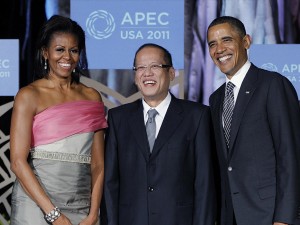
US President Barack Obama and First Lady Michelle Obama welcome President Aquino at the opening dinner of the Apec Leaders Summit in Honolulu. AP
HONOLULU—President Benigno Aquino III on Saturday received Australia’s support for the Philippines’ move to declare the West Philippine Sea (South China Sea) as a zone of peace, freedom, friendship and cooperation.
Mr. Aquino met with Australian Prime Minister Julia Gillard on the sidelines of the Asia-Pacific Economic Cooperation (Apec) summit, according to presidential spokesperson Edwin Lacierda.
“(The) Australian prime minister just mentioned that 20 percent of their exports pass through the West Philippine Sea. Basically, that’s it and the President spoke on the solution of the West Philippine Sea being a zone of peace, freedom, friendship and cooperation,” Lacierda said in a news briefing.
Asked whether there was an expression of support, Lacierda said, “Yes, yes.”
Foreign Undersecretary Laura del Rosario, who attended the bilateral meeting, said Gillard also lauded Mr. Aquino’s efforts to promote transparency and accountability.
“The Australian prime minister congratulated or applauded the President on his governance initiatives, in all his steps that he has taken to make sure that, he called it technical corruption, is also being addressed and that resources are being freed to address our need,” Del Rosario said.
Del Rosario said Gillard asked Mr. Aquino to visit Australia possibly in mid-2012.
Asked about the invitation, the President told reporters on Saturday, “We’re working on it.”
Gas deposits
Energy Secretary Jose Rene Almendras on Saturday also elaborated on the President’s statement on Friday about the discovery of substantial gas deposits.
“We’re talking about Recto Bank, which really is not in the Spratlys area,” said Almendras, a member of the Philippine delegation to the Apec summit.
He told reporters that Forum Energy, the contract service provider in the area, had been conducting seismic testing in the area. “The exploration has been continuing,” he said.
On Friday, Mr. Aquino said that the gas fields included disputed areas in the West Philippine Sea and that the deposits there “dwarfs” the Malampaya oil fields. The President said operations there would begin next year.
But Almendras clarified on Saturday that the Philippines’ gas fields were outside the Spratlys.
He also said that Manila would honor its agreement with its fellow claimants over disputed territories.
Seismic evaluation
“In the terms of China, depending on what they claim to be their basis of their claims, some of these areas will be questioned but as far as the acknowledged contested area is concerned by all of the parties involved whether China agrees to it or not is really the Spratlys area,” Almendras said.
The gas fields in the Recto Bank, Almendras said, showed “very good results on seismic evaluation and even previous wells that were dug as early as 1976 (and) are not in the Spratlys area.”
The President, in his State of the Nation Address this year, made an unequivocal claim over Recto Bank, saying being in the area is like being on CM Recto Avenue in Manila.
China, however, is also claiming the bank as one of its territories. Aside from the Philippines and China, claimants over the Spratlys include Vietnam and Malaysia, Taiwan and Brunei.
During a session of the Apec CEO Summit on commodity security, Mr. Aquino told a panel that work in a gas-rich area would commence next year.
Almendras clarified the President’s earlier statement that the area would be in northern Philippines. He said the area of Recto Bank lay just north of Palawan.
“This is not in the contested area,” Almendras said.
He acknowledged that the area was “a new field,” as Mr. Aquino said, because it has yet to go into the “development mode.”
New gas fields
The President referred to the new gas fields during a session on commodity security of the Apec CEO Summit when asked what his government was doing to address cost of electricity in the country—one of the highest in the region.
“There are substantial gas deposits that we believe are already in the proven scale at this point in time that will dwarf the Malampaya oil fields. Some of them are in areas that are part of the contentious disputes as to sovereignty over the same.”
He said his government was working on “steps to determine as to who actually owns them consistent with the United Nations Convention on the Law of the Sea.”
“We are hoping that all the signatories to the United Nations convention will adhere to the stipulations of the convention,” Mr. Aquino said.
He said this included the 370-kilometer (200-mile) exclusive economic zone, “which clearly shows that the areas in dispute are in our favor.”
The President said the Philippines could go for arbitration to settle the matter “once and for all and to have these resources benefit not only our country but our neighbors in the region.”

